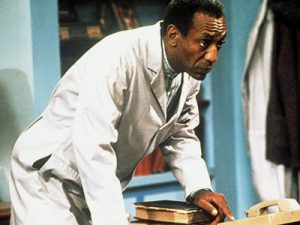 We all know that a family can come in many different forms. There is no true singular definition for what “family” means, and as our world is changing and embracing differences, it’s great to read stories of modern families. In a recent interview with CNN, Dan Bucatinsky, the 47-year old actor, producer and author, who most recently won an Emmy for a guest role on ABC’s “Scandal,” the actor opens up about finding his “inner mommy” when it comes to raising his two young children.
We all know that a family can come in many different forms. There is no true singular definition for what “family” means, and as our world is changing and embracing differences, it’s great to read stories of modern families. In a recent interview with CNN, Dan Bucatinsky, the 47-year old actor, producer and author, who most recently won an Emmy for a guest role on ABC’s “Scandal,” the actor opens up about finding his “inner mommy” when it comes to raising his two young children.
Bucatinsky, who plays a gay dad on TV, is also a gay dad in real life. Together with his husband, Don Roos, the pair are fathers to Eliza and Jonah. Within the interview, Bucatinsky opens up about how the definition of “family” is evolving. He also wrote a book on the road to becoming a family in his memoir, “Does This Baby Make Me Look Straight?: Confessions of a Gay Dad.”
CNN is even reaching out to same-sex parents in hopes to highlight creative ways in which they address their parenting roles. A portion of the interview is below. For the full interview, click here.
CNN: When you were growing up and coming to terms with being gay, did it ever cross your mind that you might someday be a father?
Dan Bucatinsky: It wasn’t something that I dared to aspire to. I lived a lot of years in denial. I spent a lot of my teen years promising myself that if it turned out to be true, that I would kill myself. I’m really glad that I didn’t fulfill that promise.
Even early in my 20s when I came out of the closet, I wasn’t really thinking about marriage. I focused on my career, and I didn’t have a clear picture of my future as being in a relationship, having kids and having a domestic life. By 27, I was settling down, and it became clearer to me that it was something I was subconsciously craving.
I was so envious of the gay men I’d meet who wore wedding rings. I remember feeling some kind of pang in my mid-to-late 20s. Maybe it was too painful to really picture. I felt like it wasn’t in my cards. I met Don when I was 27, and we didn’t have kids until I was 40. For 12 years we talked about it, but not seriously, until the last five years. I didn’t believe it was possible, so now, when I think about it, it’s just surreal.
CNN: When you talk to young, gay men about parenthood now, do their expectations differ from that?
Bucatinsky: It’s amazing how different it is now to talk to someone who is exactly my age when I met Don — a 27-year-old out, gay man (who has probably been out since he was 15). It’s a foregone conclusion that if they want it, marriage and kids could be in their future. Parents used to say, “I love you just the same that you’re gay, but it’s such a sad, lonely life,” but that can’t be said anymore.
CNN: When parenthood was finally happening for you and your husband, did you worry about not having a blueprint for it?
Bucatinsky: While we were expecting Eliza, I was in such shock and denial that it was really happening. It didn’t occur to me what would happen when we took that baby home. I didn’t really think it through. Nor did my spouse and I have long enough discussions about our parenting styles. We have subsequently discovered our differences, which hopefully leads to a little yin and yang with the kids.
There were parents that to me were just the ideal. Many of them were straight moms who have just been great, supporting, warm, funny and tough, at least in my perception of them. I’m sure they all had their own bouts of self-doubt. They became my role models, and I hoped I could be as good as them; their kids turned out so great.
CNN: Is motherhood necessarily tied to femininity?
Dan Bucatinsky: It’s not. What I discovered inside me that I didn’t realize was there, was mommyness. But by definition of the fact that I’m not a mommy, if I’m finding qualities that I’m describing as “mommyness” then why do I have to attach a gender to them? Why can’t we move to a time where “parent” is an umbrella term that encapsulates a lot of things: discipline, nurturing, sustenance, support and boundaries?
When you’re a gay dad, you get the question, “Which one of you is the mom?” I used to get offended by it, but now I just answer: I am. If you’re asking me in the way that I’m using the term “mom” loosely, then yes, I have fallen into those more mommyish kinds of roles. Don has fallen more into the daddyish roles, but that doesn’t mean that he doesn’t do bath time. But straight parents, too, any modern dad now is doing the same kinds of things. It doesn’t really have to do with gay or straight anymore.














